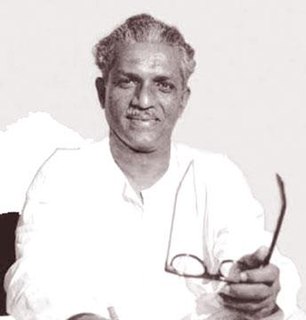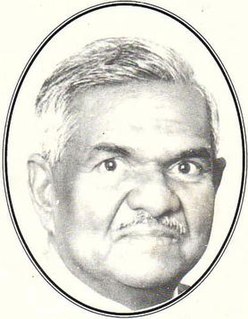Related Research Articles

Sri Lanka, officially the Democratic Socialist Republic of Sri Lanka, is an island country in South Asia, located in the Indian Ocean southwest of the Bay of Bengal and southeast of the Arabian Sea. It is geographically separated from the Indian subcontinent by the Gulf of Mannar and the Palk Strait. Sri Jayawardenepura Kotte is its legislative capital, and Colombo is its largest city and centre of commerce.

Sirima Ratwatte Dias Bandaranaike, commonly known as Sirimavo Bandaranaike, was a Sri Lankan stateswoman. She became the world's first non-hereditary female head of government in modern history, when she became Prime Minister of Sri Lanka in 1960. She served three terms: 1960–1965, 1970–1977 and 1994–2000.
Bolshevik–Leninist Party of India, Ceylon and Burma (BLPI) was a revolutionary Trotskyist party which campaigned for independence and socialism in South Asia.
The Hartal 1953 was a country-wide demonstration of civil disobedience and strike, commonly known as a hartal, held in Ceylon on 12 August 1953. It was organized to protest of the policies and actions of the incumbent United National Party government. It was the first mass political action in Ceylon and the first major social crisis after independence. This event is of historical significance because it was the first people's struggle against an elected government in the country.
The Official Language Act No. 33 of 1956, commonly referred to as the Sinhala Only Act, was an act passed in the Parliament of Ceylon in 1956. The act replaced English as the official language of Ceylon with Sinhala. Due to the lack of official recognition to Tamil, the Tamil Language Act of 1958 was passed and in 1987 the Thirteenth amendment to the Constitution stated that, “the official language of Sri Lanka is Sinhala” while “Tamil shall also be an official language,” with English as a “link language.”

Edmund Peter Samarakkody was a Ceylonese lawyer, trade unionist, politician and Member of Parliament.

Don Philip Rupasinghe Gunawardena was a prominent Sri Lankan politician and founder of the Lanka Sama Samaja Party, the first political party in Sri Lanka. He is known for having introduced Trotskyism to Sri Lanka, where he is a National Hero for his role in the Sri Lankan independence movement, and is known as 'the Father of Socialism' and as 'the Lion of Boralugoda'. He was a long-time member of parliament and had served as Minister of Industries and Fisheries in Dudley Senanayake National Government Cabinet of Ceylon, as well as Minister of Agriculture and food under S. W. R. D. Bandaranaike from 1956-1959.

Sri Lankan Tamils, also known as Eelam Tamils, Ceylon Tamils or simply Tamils, are members of the Tamil ethnic group native to the South Asian island state of Sri Lanka. Most modern Sri Lankan Tamils claim descent from residents of Jaffna Kingdom, a former kingdom in the north of the island and Vannimai chieftaincies from the east. According to the anthropological and archaeological evidence, Sri Lankan Tamils have a very long history in Sri Lanka and have lived on the island since at least around the 2nd century BCE. Today, they constitute a majority in the Northern Province, live in significant numbers in the Eastern Province and are in the minority throughout the rest of the country. 70% of Sri Lankan Tamils in Sri Lanka live in the Northern and Eastern provinces.

Samuel James Veluppillai Chelvanayakam was a Ceylon Tamil lawyer, politician and Member of Parliament. He was the founder and leader of the Illankai Tamil Arasu Kachchi (ITAK) and Tamil United Liberation Front (TULF) and a political leader of the Ceylon Tamil community for more than two decades. Chelvanayakam has been described as a father figure to Ceylon's Tamils, to whom he was known as "Thanthai Chelva ".
Sri Lankan Tamil nationalism is the conviction of the Sri Lankan Tamil people, a minority ethnic group in the South Asian island country of Sri Lanka, that they have the right to constitute an independent or autonomous political community. This idea has not always existed. Sri Lankan Tamil national awareness began during the era of British rule during the nineteenth century, as Tamil Hindu revivalists tried to counter Protestant missionary activity. The revivalists, led by Arumuga Navalar, used literacy as a tool to spread Hinduism and its principles.

Portuguese Ceylon is the name given to the territory on Ceylon, modern-day Sri-Lanka, controlled by the Portuguese Empire between 1597 and 1658.
Deshabhimani ('Patriot') was a Tamil-language weekly newspaper published from Colombo, an organ of the Communist Party of Sri Lanka. Deshabhimani emerged in the 1950s. During its initial years, it had a circulation of around 10,000. As of the late 1950s and early 1960s, H.M.P. Mohiden was the editor-in-chief of the publication. As of the early 1970s, P. Ramanathan was the editor of the newspaper.

Vallipuram Ponnambalam was a Sri Lankan Tamil politician and teacher. He was a prominent leader of the left-wing in northern Sri Lanka. He served as the secretary of the Jaffna District Committee of the Communist Party of Ceylon. Ponnambalam was noted for his 'clean image' as a political leader.

Leslie Simon Goonewardene, commonly known as Leslie Goonewardene, was a prominent Sri Lankan statesman. He founded Sri-Lanka's first political party, the Lanka Sama Samaja Party in 1935, and served as it's General-Secretary from 1935 to 1977. Goonewardene was a key figure in both the Indian independence movement and the Sri Lankan independence movement. He was designated as a National Hero of Sri Lanka for his leadership in the Independence movement, and his efforts are celebrated each year on the Sri Lankan Independence Day.

This is a bibliography of works on Sri Lanka.
Weerahennedige Theodore Wilfred Meryl Fernando was a Ceylonese teacher, trade unionist, politician and Member of Parliament.

Konara Mudiyanselage Podiappuhamy Rajaratne was a Ceylonese lawyer, politician and parliamentary secretary.
Watson Fernando was a Sri Lankan communist politician and trade unionist. He served as president of the Ceylon Communist Party and was a member of the Moratuwa Municipal Council.
The Ceylon Trade Union Federation was a national trade union centre in Ceylon/Sri Lanka. CTUF was founded in December 1940, united various unions led by the United Socialist Party. The founding meeting of CTUF was chaired by a Buddhist monk, Ven. Saranankara. Pieter Keuneman served as CTUF president for some time.
References
- ↑ Kearney, Robert N. (1971). Trade Unions and Politics in Ceylon . University of California Press. p. 182. ISBN 978-0-520-01713-9.
- ↑ Hobday, Charles; East, Roger (1990). Communist and Marxist parties of the world. Longman. p. 325. ISBN 978-0-582-06038-8.
- ↑ Wilson, A. Jeyaratnam (1988). The Break-up of Sri Lanka: The Sinhalese-Tamil Conflict. C. Hurst & Co. Publishers. p. 230. ISBN 978-1-85065-033-1.
- ↑ Kearney, Robert N (1973). The politics of Ceylon (Sri Lanka) . Cornell University Press. p. 237. ISBN 978-0-8014-0798-7.
| This article about a newspaper from Sri Lanka is a stub. You can help Wikipedia by expanding it. |